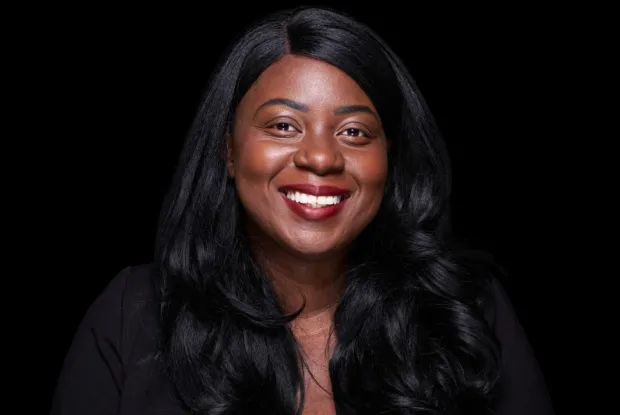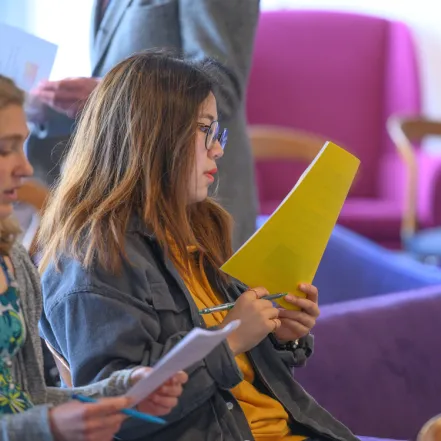Olivia Yang
Phillips Andover Academy, Andover, MA
Winner, 15th Annual Prize for High School Girls in New England and New York
奉⼦成婚1, 2004
on my parents’ wedding day, my mother refuses
to wear a dress. for the love of god just put it on, my mother’s mother
screams into the wet rotting air, which only knows to sink.
the sky a hazing, a haze of dust you could bite
into. at this point i am nothing
but an ideation of a goddess nobody wished to
serve. a sticky amorphous
oozing. i only have two
existences:
one as glue and one as the dress
my mother refuses to wear. the fabric itself only has two colors,
a chinoiserie of muted red and fading gold.
one to fight the fear of dying and the other of poverty.
in china, we bury our old at our weddings,
inside our newness and our wanting.
we join two together with glue, accepting silence as
keepsake.
i have no way of knowing what my mother
wants because i am merely the dress she refuses
to wear, a bulge of stretched skin pressing firmly against
cloth. all i know is that i do not want to force anything upon
her.
at the wedding table we sharpen our aged knives. the guests prey.
a bruise dresses the rabbit’s leg. my mother turns her face and
lends a prayer to the rotting sky. when a rabbit is chased by a dog,
its chest shudders with an instinctual desperation
telling it to go faster or it will surely die.
that fear is a kind of glue that welds the world together by force.
my mother’s mother screams at her
to wear the dress even if she doesn’t like it.
to have a child even if she doesn’t know how to raise it.
1 奉⼦成婚 (pinyin: fèng zǐ chéng hūn)
literal translation: married by the order of a child
definition: marriage necessitated by an unplanned pregnancy
Sophia Liu
Great Neck South High School, Great Neck, NY
Finalist, 15th Annual Prize for High School Girls in New England and New York
Pixie Dust
The suicide rate of Palo Alto’s high schools is about five times the national average.
After six months, Mama buys a new bag of rice—weighing down her
shoulders on the way home. At once, she spills it all out on the kitchen table.
Say there are 100,000 grains here and say you are one. The marble countertop stands
between us. She bends over and holds a translucent pellet up to me, then throws it back
into
the white mass, crashing down like a fist full of stones sinking into a river basin.
I forget that life is more than a granary.
The Caltrain blows in the distance, ghouling, strong enough for me to mistake it with the perched
fan—blustering its breath over us. The way the rice squirm becomes too familiar.
We exist. Silhouetted against the BigTech rail advertisements—remember, we are as alive as the
winter wind accompanying Baba’s nightly phone calls.
Mama tells me to clean up, so I spoon every grain back into the bag, double-checking that each
lands with the rest. Too early on, I assume I am too slow because
she slides her hand through to finish the job for me. Few fall on our
tiled floor and in a sweep, she tosses those in the bin—and like that—vaporized.
Mama, I could have been under the screeching metal—another body in that black mass.
A foot off the blacktop and my existence would linger in every direction. I can only
blame whatever configuration of stars that have placed us here—
far from hungry, but nonetheless, unfed. The absence of one, then another,
become ghosts in our classrooms that I am too scared to begin
counting. And too scared to ask Mama if she knows why. Some days, I think
I should just accept the silence; a sickness passing through left to its own accord.
Like always, Mama scoops out three cups of rice for dinner and draws
water to her first knuckle. But the rice is too thick today: reminiscent of pumpkin millet,
of powdered chalk peppered into the wind from the names etched on our school steps.
Chalk carried by the train to Menlo Park, to San Antonio, to Sunnyvale, to heaven.
Gaia Rajan
Phillips Andover Academy, Andover, MA
Finalist, 15th Annual Prize for High School Girls in New England and New York
We Were Birds
That night he wore a white shirt and leapt
into the river. Didn’t surface for air. More water
than body, more tide than blood.
We’d just turned thirteen. After,
I closed every window. The mouths of tulips
broken. Beneath every oak, a lost limb.
I folded hundreds of pigeons, mangled paper into a beak
and a body. This poem is for how his voice cleaved the air
into feathers, how I took a knife to the wall after,
until a moon of light shone through the apartment,
until my knuckles bled like his.
Suppose I woke and saw only lightning.
Suppose the birds burned their songs
that summer. Suppose I speared sharks
in the river. I screamed Peter
which meant pray which meant please. How a name can sound
like a clock. A grave in a field full of ticking. Week-old
feathers. This boy, this bird-- too human
for this earth. Which is to say: sometimes, I don’t exist
except in the universe where everyone stays alive, where wings sprout
from our spines, where we have more to give
than prayer. Which is to say: the morning after,
I gave my bones to the water. Feathers wavering
in the river.
A blackbird in the oaks.
Originally published in Kissing Dynamite
Sophie Zhu
Williamsville High School East, Williamsville, NY
Finalist, 15th Annual Prize for High School Girls in New England and New York
The Film of Yellow (poem not posted as per author’s request)

